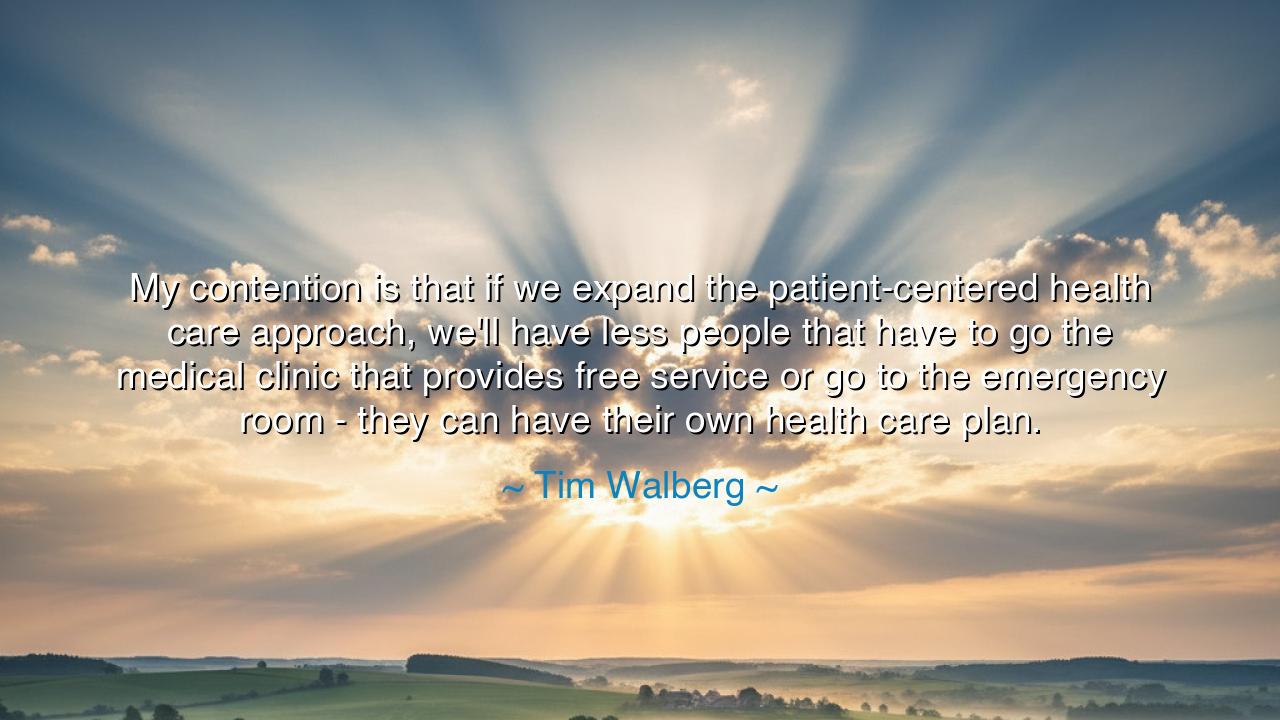
My contention is that if we expand the patient-centered health
My contention is that if we expand the patient-centered health care approach, we'll have less people that have to go the medical clinic that provides free service or go to the emergency room - they can have their own health care plan.






In the age of wisdom, the art of healing was viewed not only as the restoration of the body but as the nurturance of the whole person. Tim Walberg, with his keen understanding of healthcare, imparts this wisdom: "My contention is that if we expand the patient-centered health care approach, we'll have less people that have to go the medical clinic that provides free service or go to the emergency room — they can have their own health care plan." In this statement, he urges us to move beyond merely treating the sick and toward a deeper, more holistic approach to health—one that empowers the individual and strengthens the community.
In the ancient world, healing was not simply the application of remedies but the restoration of balance and harmony within the individual. Hippocrates, the father of medicine, believed that true health could only be achieved when the body, mind, and spirit were aligned in balance. He recognized that a patient-centered approach—one that considers not only the physical ailments but also the emotional, social, and spiritual aspects of the individual—was paramount. In the same way, Walberg calls for an approach that moves beyond mere treatment to a comprehensive plan that considers the whole person, guiding them toward preventative care and well-being.
Patient-centered care, as Walberg advocates, is a revolutionary shift away from the traditional medical model, which often focuses on crisis management rather than long-term health. In ancient times, healers worked closely with their patients, understanding their habits, their lives, and the environments in which they lived. This deep knowledge allowed for more effective treatments and preventative measures. The patient-centered approach seeks to replicate this bond, ensuring that individuals have access to personalized care that addresses their unique needs, rather than offering a one-size-fits-all solution. This shift places the individual at the heart of the healthcare system, empowering them to take an active role in their own well-being.
Consider the example of Florence Nightingale, who revolutionized nursing and health care through her focus on the individual needs of the patient. She understood that healthcare must be centered not just on the disease, but on the whole person—their comfort, their dignity, and their unique circumstances. Her approach to healthcare was deeply personal and humane, and it led to lasting reforms that have shaped modern medicine. Nightingale's philosophy aligns with Walberg’s vision, advocating for a system where individuals are not mere recipients of care but active participants in the management of their own health.
The call to expand patient-centered care is a call to move toward prevention, to ensure that people are not simply reacting to illness but actively maintaining their health. This preventative mindset requires that individuals are equipped with the knowledge and resources to take control of their own health. Education becomes a cornerstone of this approach, enabling people to make informed decisions about their lifestyles, diets, and overall health. When individuals have their own health care plan, they are empowered to take responsibility for their well-being, reducing the need for reactive measures like visiting free clinics or relying on emergency rooms for care.
The emergency room often symbolizes the failures of a system that reacts to illness rather than preventing it. In the time of the ancients, when health was seen as a balance between the humors and the environment, crises were understood as signals that the body had been thrown out of harmony. Modern medicine, however, has often focused on fixing what is broken rather than maintaining balance before the crisis occurs. Walberg’s insight offers us the opportunity to rethink this dynamic—if we shift the focus from treatment to prevention, we can ensure that fewer individuals find themselves in the emergency room, forced to deal with crises they could have avoided.
Thus, the lesson is clear: we must embrace the philosophy that health is not a mere absence of disease but the presence of balance, vitality, and self-care. Walberg’s vision is not simply about expanding healthcare coverage; it is about empowering individuals to take charge of their own healthcare journey. The patient-centered approach asks each person to be an active participant in their own well-being, fostering a culture where health is seen as a lifelong commitment rather than a series of reactive measures.
Let us, then, heed Walberg’s call to expand the patient-centered approach to healthcare. We must invest in education, prevention, and empowerment, ensuring that every individual has the tools they need to maintain their health. By doing so, we not only reduce the burden on our medical system but also strengthen the fabric of society, where every person is not merely a patient but a steward of their own health. Let us build a world where the pursuit of health is not a reactive response but a proactive way of life, grounded in knowledge, balance, and self-respect.






AAdministratorAdministrator
Welcome, honored guests. Please leave a comment, we will respond soon